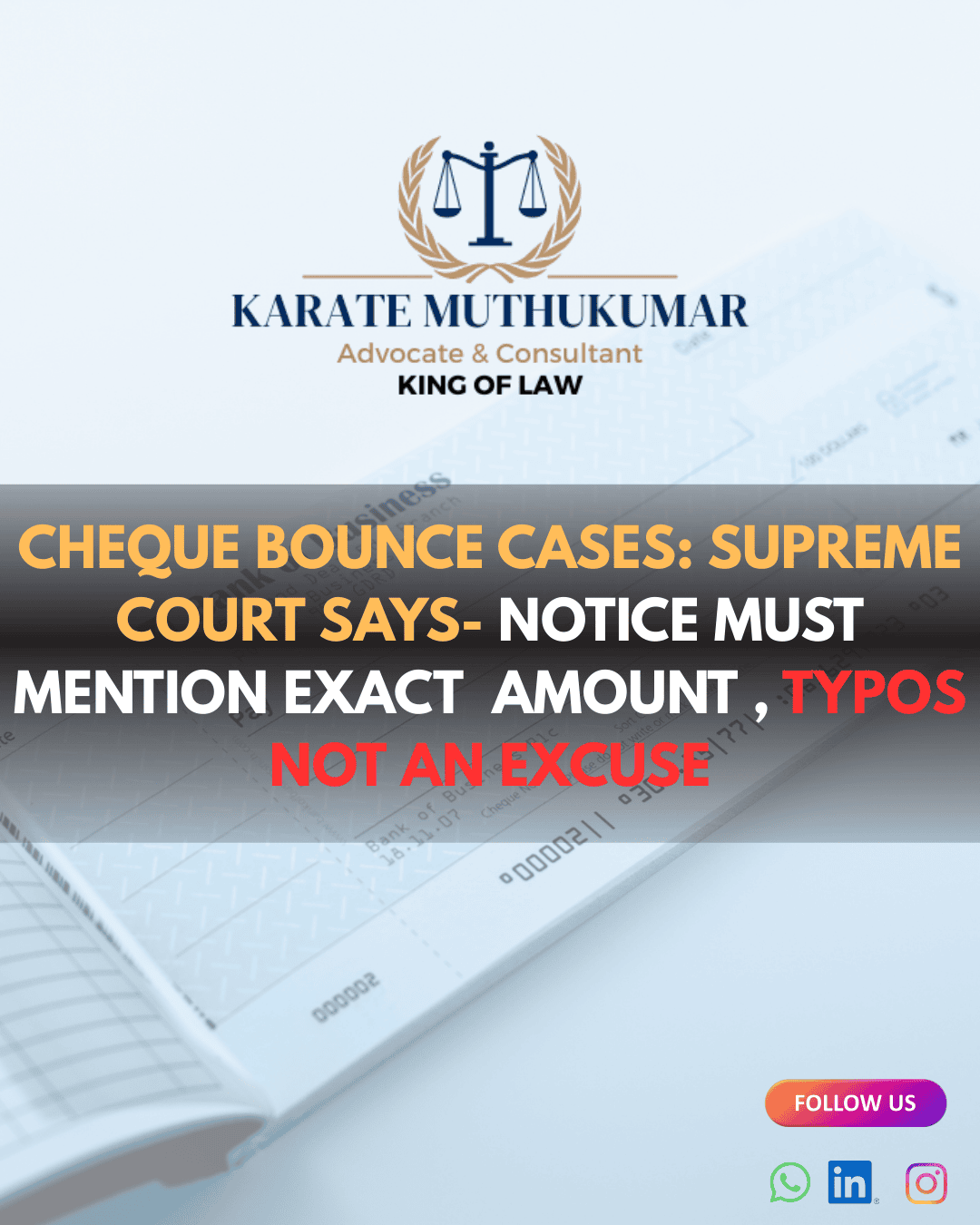
🔹 What Happened?
When a cheque bounces, the payee (the person who is supposed to receive money) must send a legal notice to the drawer (the person who gave the cheque).
This notice must:
Inform that the cheque has bounced.
Demand payment of the cheque amount.
Give 15 days’ time to make the payment.
In this case, the drawer argued that the notice was invalid because there was a mistake in the amount mentioned. They claimed that due to this “typo error,” the entire case should be thrown out.
When a cheque bounces, the payee (the person who is supposed to receive money) must send a legal notice to the drawer (the person who gave the cheque).
This notice must:
Inform that the cheque has bounced.
Demand payment of the cheque amount.
Give 15 days’ time to make the payment.
In this case, the drawer argued that the notice was invalid because there was a mistake in the amount mentioned. They claimed that due to this “typo error,” the entire case should be thrown out.
🔹 What Did the Supreme Court Say?
The SC made two very clear points:
Exact Amount Must Be Stated in the Notice
The law requires the notice to clearly mention the sum of money claimed.
The accused should know exactly how much is being demanded so that they can pay within the stipulated time.
Typo or Clerical Mistake Is Not a Defence
If the cheque amount is clearly mentioned in the cheque itself, and the notice broadly conveys the same demand, a small typographical error will not save the accused.
Otherwise, dishonest drawers could misuse small spelling/number mistakes to escape liability.
🔹 Why Is This Important?
Many cheque bounce cases get delayed for years because of technical objections.
For example:
Wrong amount mentioned in words vs. figures.
Typo in the cheque number.
Spelling mistake in the name.
With this ruling, the SC has clarified:
👉 The substance of the notice matters more than minor errors.
👉 The drawer cannot hide behind small technicalities if they actually owe the cheque amount.
Many cheque bounce cases get delayed for years because of technical objections.
For example:
Wrong amount mentioned in words vs. figures.
Typo in the cheque number.
Spelling mistake in the name.
With this ruling, the SC has clarified:
👉 The substance of the notice matters more than minor errors.
👉 The drawer cannot hide behind small technicalities if they actually owe the cheque amount.
🔹 What Should You Do If Your Cheque Bounces?
Send a Legal Notice within 30 days of getting the bank’s return memo.
Clearly mention the cheque amount, cheque number, date, and the reason for dishonour.
Give the other party 15 days to pay.
If they don’t pay, you can file a case under Section 138 NI Act.
💡 Tip: Always get the notice drafted by a lawyer to avoid unnecessary mistakes.
Send a Legal Notice within 30 days of getting the bank’s return memo.
Clearly mention the cheque amount, cheque number, date, and the reason for dishonour.
Give the other party 15 days to pay.
If they don’t pay, you can file a case under Section 138 NI Act.
💡 Tip: Always get the notice drafted by a lawyer to avoid unnecessary mistakes.
🔹 Key Takeaway for the Common Man
If you are issuing cheques, ensure sufficient funds—a bounced cheque can lead to jail up to 2 years and fine up to twice the cheque amount.
If you are receiving a bounced cheque, don’t worry about small typos in your notice—the SC says these cannot be used as an excuse by the other side.
👉 In short: What matters is the real cheque amount, not minor spelling or typing mistakes.
If you are issuing cheques, ensure sufficient funds—a bounced cheque can lead to jail up to 2 years and fine up to twice the cheque amount.
If you are receiving a bounced cheque, don’t worry about small typos in your notice—the SC says these cannot be used as an excuse by the other side.
👉 In short: What matters is the real cheque amount, not minor spelling or typing mistakes.

